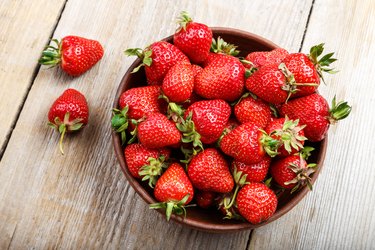
Strawberries are a tasty and nutritious fruit. Still, they can cause digestive distress for some. So, do strawberries cause gas?
First, the good news: This red, sweet fruit is a good source of vitamin C, antioxidants and fiber (more on that later), per the U.S. Department of Agriculture.
Video of the Day
Video of the Day
However, if eaten in excess, strawberries are hard to digest for some people, which can lead to unpleasant symptoms like gas and upset stomach. Here are the potential reasons why strawberries cause gas:
1. They're High in Fiber
Fiber is essential for our bowel health. People often eat more fiber to relieve constipation, and the nutrient can also help you maintain a healthy weight and lower your risk for conditions such as diabetes and heart disease, per the Mayo Clinic.
And strawberries are high in fiber — just 1 cup of the colorful fruit contains 3 grams of the nutrient, according to the Mayo Clinic.
But adding too much fiber to your diet too quickly — which can happen if you overload on strawberries — can lead to digestive troubles like gas, bloating and cramping.
Fix it: Take it slow as you increase fiber intake, per the Mayo Clinic, as easing into it allows your digest system to adjust to processing more fibrous foods. And drink plenty of water, which may help your body better process fiber and minimize uncomfortable side effects.
How Much Fiber Should You Eat?
According to the 2020-2025 Dietary Guidelines for Americans, adults should aim to eat between 22 and 34 grams of fiber each day (depending on how many calories you eat overall).
2. You Have a Food Intolerance
If you find strawberries do cause gas every time you snack on them, it's possible you have a food intolerance, which is when your body has a hard time digesting certain ingredients, per the Cleveland Clinic.
Signs of a food intolerance include:
- Diarrhea
- Gas
- Bloating
- Headaches or migraines
- Nausea
- Upset stomach
- Heartburn
Sometimes, though, a straightforward intolerance to strawberries isn't to blame. More commonly, people have an intolerance to sugars in the fruit — typically fructose and/or sorbitol.
Per Kaiser Permanente, symptoms of fructose or sorbitol intolerance include:
- Gas
- Bloating
- Abdominal pain
- Diarrhea
Fix it: Talk to your doctor if you suspect you might have an intolerance to strawberries or their sugars. Usually, reducing or eliminating the food from your diet can help you manage symptoms, per the Cleveland Clinic.
Tip
Conditions like celiac disease and inflammatory bowel disease can make you more prone to food intolerances, according to the Cleveland Clinic.
3. Your Body Can't Absorb Fructose
Another potential reason for strawberry gas is fructose malabsorption, a condition where the cells of the small intestine can't absorb fructose properly, according to the U.S. National Library of Medicine (NLM).
As mentioned previously, fructose is a sugar naturally found in strawberries (along with other fruits, fruit juices, some vegetables and honey), per the Mayo Clinic. And when your digestive system doesn't absorb fructose properly, it can lead to gas, diarrhea and bloating.
It's important to note that fructose malabsorption isn't the same thing as fructose intolerance — malabsorption is when your intestinal cells aren't working properly, per the NLM. Symptoms can include:
- Gas
- Bloating
- Diarrhea
- Constipation
- Stomach pain
Fix it: Talk to your doctor if you regularly experience side effects after eating strawberries to see if you may have fructose intolerance or malabsorption. Limiting your fructose intake and eating lower-fructose foods may help you manage your symptoms, per the Mayo Clinic.
Tip
Snacking on strawberries too quickly can also cause gas — after all, those berries are hard to resist. Eating too fast can prompt you to swallow more air, which can lead to bloating and gas, per Northwestern Medicine.
- Mayo Clinic: "Chart of high-fiber foods"
- U.S. Department of Agriculture and U.S. Department of Health and Human Services: "2020-2025 Dietary Guidelines for Americans"
- Cleveland Clinic: "Food Intolerance"
- Kaiser Permanente: "Fructose or Sorbitol Intolerance"
- Mayo Clinic: "Fructose intolerance: Which foods to avoid?"
- U.S. National Library of Medicine: "Hereditary fructose intolerance"
- Northwestern Medicine: "Quick Dose: Is Eating Too Fast Unhealthy?"
- Mayo Clinic: "Dietary fiber: Essential for a healthy diet"
- U.S. Department of Agriculture: "Strawberries, raw"
Is this an emergency? If you are experiencing serious medical symptoms, please see the National Library of Medicine’s list of signs you need emergency medical attention or call 911.


